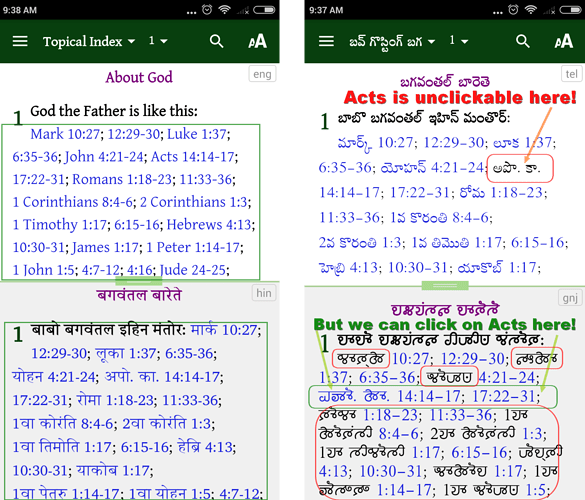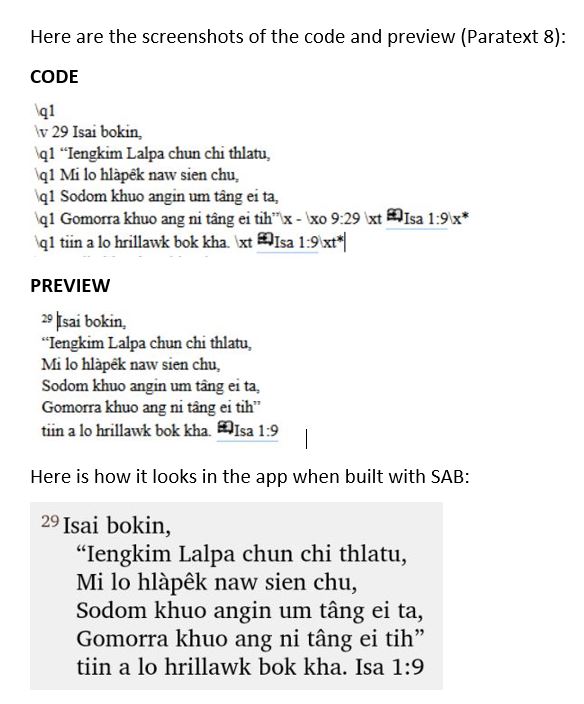I don’t know if this is related to the issue, or whether it is just similar, but a few weeks ago a team alerted me to a problem with the LINKs in a Topical Index that were included in an App. They have multiple scripts in the App and the index works flawlessly for Devanagari/Hindi, and English (see left screenshot), and mostly works for Telugu (tel) script - except for one anomaly (the book of Acts which has two full-stops in it). Interestingly, for the Gunjala Gondi script (gnj) (which is in the PUA) it only works for Acts and NOT for any of the others! So I’m puzzled as to what is/isn’t happening behind the scenes. Is it a rare SAB bug, or is something messed up somewhere? [My best guess is that it is something to do with the RegEx that looks for book names (and the 2 periods/fullstops are confusing it), BUT then why does it happen to work fine for HIN and GNJ, but not TEL. It is certainly a bit of a mystery to me.]
I think it is a different issue but still related to links. It is not recognising the book name. What does the Telagu Book names and Scripture Reference settings look like?
For Gunjala Gondi I’d want to see the Book names and Scripture Reference Settings.
Then a comparison may reveal something setting wise. But it is likely the matching currently can’t handle the variation in naming used.
I also had a problem with cross references. Some book abbreviations didn’t work, it was mainly when spaces and full stops were involved. I did replacements in the Changes section and it worked:

Hello,
I am using the latest SAB 5.4 (April 07, 2019). My cross -referencing is also not working when I built the apps.
As you might noticed, the \x - \xo 9:29 \xt Isa 1:9\x* code is not viewable in both the Paratext 8 preview and SAB generated app. However, the cross referenced Bible book, chapter and verse are viewable for the code \xt Isa 1:9\xt* but not linked.
Any suggestion to solve this will greatly be appreciated!
\x - \xo 9:29 \xt Isa 1:9\x*
This is a USFM question. Instead of the \x - put in any other character the default is \x +.
\x + \xo 9:29 \xt Isa 1:9\x*
Putting in a - says you want to hide the cross reference.
My mistakes. I was working on NT. And did not entered the verses of the OT yet. And so this works:
\xt Isa 1:9 \xt*
Sorry if I caused any confusion. 
I have one more “cross reference not working” issue for this thread. My cross references are embedded in footnotes, like this:
\f * \fr 1:13 \fq al-amur al-antaaku Muusa abd Allah \ft Al-taariikh da talgooh fi \+xt Adad 32:28-32\+xt*.\f*
In this case Adad is both the Book Name and the Abbreviation, so that wasn’t an issue. But you can see that I use the embedded cross-reference form required by Paratext: \+xt. It appears that these cross-references aren’t turned into links by SAB.
But I seem to have fixed the problem by removing the “+” from the SFM. I did this with an entry on the Changes tab:
Find \+xt, Replace xt
Note that since this is in regular expression format, the \+ just means a plus sign, and has nothing to do with the backslash characters in the text.
Hope that helps someone else along the line…
The USFM documentation seems lacking on a few points. It has no examples in the 2.4 or 3.0 documentation for footnotes of including \xt in in a footnote. Yet that can be done. Also the embedded markers like you used here are not well documented. Only one footnote example is given (if you can find it) In 3.0 Docs here: http://ubsicap.github.io/usfm/characters/nesting.html and in 2.4 PDF on page 60.
My takeaway is that only character styles can be nested or embedded. \xt is not a character style it is a functional linking markup.
Most footnote items are mutually exclusive a \fq does not occur in a \ft. Likewise \xt should be seen the same way. In your example \ft Al-taariikh da talgooh fi \+xt Adad 32:28-32\+xt*.\f* would most simply be written: \ft Al-taariikh da talgooh fi \xt Adad 32:28-32.\f*.
This is the \xt teminates the \ft markup and is itself terminated by the end of footnote marker \f*.
I find it helpful sometimes to look at the USX version of the USFM to understand the rules.
I have a project where the source text files are not pulled out of Paratext (they are from the DBL, I believe) and it appears that SAB doesn’t have a cross reference configuration from which to base the finding of cross references in the glossary. So for example, I have “(See Mt 16.16)”, which doesn’t produce a cross reference, but if I insert a change to remove "See ", then the text “(Mt 16.16)” does produce a cross reference. In Paratext, I believe the reference would be found because the “Extra Material” in the Biblical Reference Parameters would include “See”. And similarly, I think some of the ranges are not interpreted correctly from what would be defined in the Biblical Reference Parameters.
So the question is… Does SAB somehow read the project Biblical Reference Parameters and do the right thing? Or does it have some internal parameters for finding references, and if it is not finding references properly, then it probably would be best to use \xt … \xt* to manually define the references, rather than count on the automatic process?
Issue with cross reference not recognizing book abbreviations, ie. 1 Jo or 1 Ko. All other references are linked correctly, however when the book has a number space name then the reference is not linked or is incorrect.
Here is the SFM syntax: \x + \xo 1.4 \xt Jo 5.26, 8.12, 9.5, 1 Jo 5.11\x
In this case, 1 Jo 5.11 is showed in the popup window in SAB however no hyperlink to the text. It is like the 1 space Jo is not recognized. There are also times, example the 1 is hyperlinked but the rest of the reference is not. In that case the 1 would be linked to the previous reference though as verse 1.
The only noticeable difference is the current syntax has commas between book references. USFM shows semicolon as the break between book references. Is there anything else I’m missing? The only problems found so far by using commas is noted above by book names with numbers (example, 1 Corinthians, 1 Timothy, 1 John, etc.)

